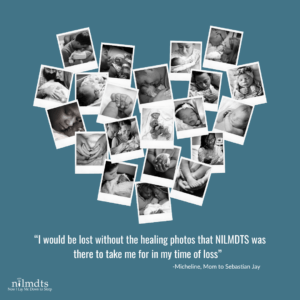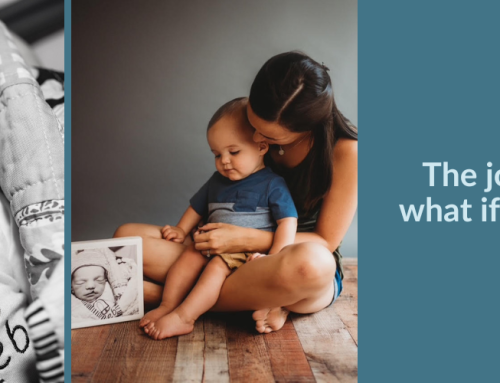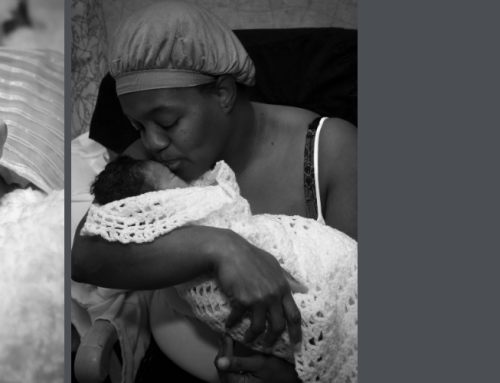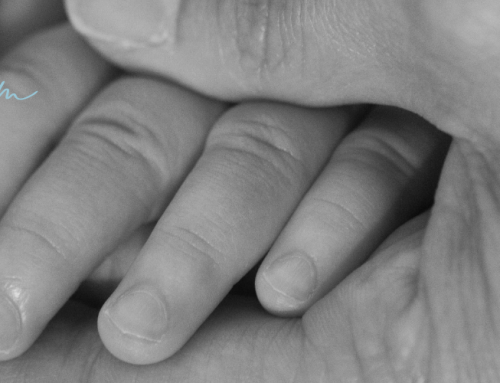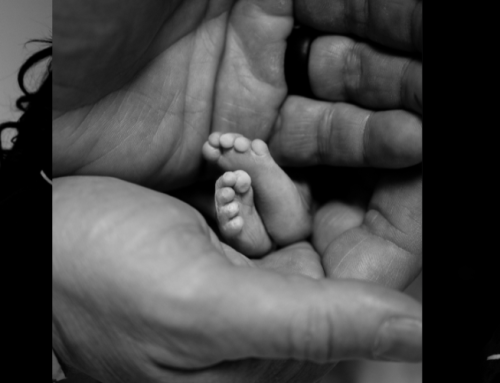Waiting with Gabriel: A Story of Cherishing a Baby’s Brief Life
“You have a beautiful baby,” the ultrasound technician said quietly. She was studying the flickering images on her screen, staring intently at the shadows of the tiny heart. I think she had already seen that our baby was going to die.
Outside, a cold April rain dripped onto buds waiting to bloom. Inside the darkened hospital examination room, the technician guided the transmitter over my five-and-a-half-months-pregnant belly, interpreting the sound waves that bounced back from our squirming baby. Legs, arms, brain, spine, kidneys—everything perfect. You know we’re here to see the heart, right? we asked. Yes, she did.
The technician finally got around to studying the heart. The rhythmic whooshing seemed to fill the room, a reassuring sound in any other circumstances. She fell silent. Looking, pressing on my belly to try to nudge the baby into another position, tapping keys on the machine’s keyboard. Looking. Was that the sound of my baby’s heart or mine?
Finally, I ventured, “For telling our families—does it look like something is wrong?”
She kept her eyes on the screen and said quietly, “Yes.”
People often use physical terms to try to describe what it feels like to hear devastating news—that it’s like being punched in the stomach, like being hit by a truck, or like the world is crashing in on them. To me it felt like falling backward, as though the tiled concrete floor, the clay underground, all the subterranean layers of rock were simply and soundlessly parting to let me through to some other dimension.
What followed was an extraordinary journey of grief, joy and love as we waited with Gabriel, simultaneously preparing for our son’s birth and for his death. Despite some wrenchingly aggressive surgical options, no one could give our son a good heart. So we set out to give him a good life.
We tried to give our daughters, and ourselves, as normal a summer as possible. Many times we spoke of doing something “with Gabriel.” We took him fishing on a secluded lake near Lake Superior. I took Gabriel swinging on the girls’ backyard swings. We took him to a baseball game and to a choral concert.
As Gabriel grew and settled into position for birth, I could almost always feel one of his little feet just to the right of my navel. No matter where I went, I could take him with me. And when the grief came crashing over me, I could seek solace in curling around him. Among all the people being affected by Gabriel’s expected death, I began to feel like the fortunate one.
The months of waiting culminated in two-and-a-half peaceful hours of cradling Gabriel in our arms, in the same bed where he was born, surrounded by family and friends until his imperfect little heart finally stopped beating altogether.
As we had written in our birth plan, “Our overriding wish is that our son Gabriel’s birth and short life be filled only with comfort and love.” And it was.
People sometimes are astonished—and perhaps a little horrified—that I walked around pregnant for three-and-a-half months carrying a baby I knew would die. We were well aware that terminating the pregnancy was an option and, in some circles, an expectation.
Now that we’ve been through it, I believe that aborting my pregnancy would have been disastrous on many levels. Most important, it would have cut Gabriel’s natural life short for no good reason.
It would not have been a shortcut through our grief. If anything, our grief would have been magnified. We would have been left with only the raw pain and without the memories of our son and the time-tested rituals of grief to soften it. Perhaps some people thought we were bringing grief upon ourselves by continuing the pregnancy and having a full funeral and burial. Some must have thought that we should just get on with our lives. But for that brief time, Gabriel was our life. Other than caring for our two daughters, there was nothing more important in our lives than waiting with Gabriel, giving him the full measure of our time and attention and love.
I also felt that ending the pregnancy early would have contributed to the perception that the loss of an unborn baby is of little consequence. And we would still have been in shock a week or two later, when others would have been expecting us to get over it already. Instead, my growing belly was a constant reminder to others of what we were going through. Perhaps that meant that everywhere we went, death was an uninvited and unwelcome guest. But it also resulted in our receiving an extraordinary level of support, rare for parents grieving the loss of their “invisible” babies.
Aborting our pregnancy would have meant denying ourselves the life-changing, bittersweet, exquisite experience of holding our beautiful full-term son and hearing his cries. We didn’t realize until later how crucial and sustaining those memories would be. Aborting Gabriel would have meant rejecting a gift.
I believe that ending our pregnancy early would have caused us real emotional harm, as well as closed us off from the extraordinary gifts that we and our families and close friends were able to experience as we all waited with Gabriel.
Yes, Gabriel was going to die. But first he was going to live.
Excerpted from Waiting with Gabriel: A Story of Cherishing a Baby’s Brief Life by Amy Kuebelbeck (Loyola Press 2003). Reprinted with permission of Loyola Press. To order copies of this book, call 1-800-621-1008 or visit http://www.loyolapress.com/.
About Amy Kuebelbeck
– Freelance writer and former reporter and editor for The Associated Press and other news organizations
– Author of Waiting with Gabriel: A Story of Cherishing a Baby’s Brief Life
– Lead author of A Gift of Time: Continuing Your Pregnancy When Your Baby’s Life is Expected to be Brief
– Editor of the the website PerinatalHospice.org

